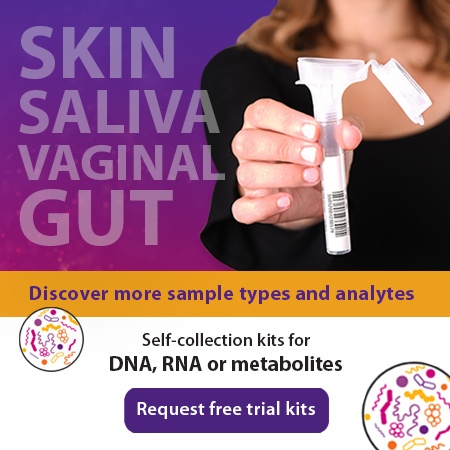2020-08-28
“Metabolomics is the study of small molecules that are the result of metabolic processes. They are the output of biological processes such as the ones that happen in our body and in our cells everyday. It is a field of study which combines analytical chemistry, biochemistry and biology. The analytical chemists help us analyze the compounds, biochemists help us understand how these compounds are formed through biochemical processes and biologist help us understand how they play into systems biology.” - Heloise Breton, PhD.
The question of “What is Metabolomics” has been recently buzzing around the scientific community. With the advances of new technology, a gateway to studying metabolomics has been opened. Over recent years, microbiome researchers have begun to incorporate metabolomics, the “missing piece of the puzzle”, as part of their multiomics studies To understand that missing piece more clearly and what it could mean for the future of multiomics, I hosted an episode on DNA GenotekTM’s Molecules, Microbes, and Multiomics podcast featuring two experts from DNA Genotek, Dr. Heloise Breton, Product Manager for Microbiome products, and Dr. Olle de Bruin, R&D Scientist - microbiome/metabolomics.
I will highlight the key take-aways from my conversation with Dr. Breton and Dr. de Bruin about what metabolomics is and how it is taking the scientific community by storm. If you are interested in the full discussion you can listen to the full episode below.
Many researchers and companies are conducting multiomic studies that incorporate the metabolome and the microbiome. Why is that?
Dr. Olle de Bruin: “From a microbiome perspective it is really about using a more integrative approach. For example, the microbiome tells you who is there and to a certain extent what they are doing. By bringing metabolomics into the picture, you can now say how they are doing it at the small molecular level. Then you gain that added understanding of the microbiome and the metabolome... For example, the success story of finding short-chain fatty acids – which is a microbial metabolite for gut health. So, you can see the importance that the microbiome and metabolome have together.”
Dr. Heloise Breton: “Thankfully, there has already been research in the space that has shown how we might have been misinterpreting microbiome data because we were only looking at microbiome data and inferring what those micro-organisms were doing rather than actually checking what they were doing. Metabolomics is like that fact check of that data. We were looking at one angle of the picture only and now we get to look at the picture straight on and better interpret what was actually there. This elevates the discovery potential of what can be harnessed from microbiome data and will likely lead to some very interesting research in the medical and health fields.”
Metabolites are very commonly found in blood. Researchers and companies, like DNA Genotek, are encouraging the study of metabolites in feces. Why is that?
Dr. Heloise Breton: “Blood is the most common sample used in metabolomics mainly because a lot of the metabolites our body produces end up in blood and are easily detected in blood. That is not to say that all of the compounds that are interesting, specifically from a gut microbiome point of view, will end up in the bloodstream. That is why people are now considering looking at feces rather than another output, such as blood or urine.”
Dr. Olle de Bruin: “Feces contain a lot of uncharacterized small molecules. So simply looking at the metabolome of feces and describing what is there is a win in itself. After that, you can look at what are the roles of these uncharacterized molecules and what is their importance in the whole system.”
There are many challenges with stool including standardization of methods to ensure the best results downstream. Would you be able to tell us more about the challenges with stool and how we’re working to overcome them?
Dr. Heloise Breton: “Luckily for DNA Genotek, because we already had a microbiome fecal sample collection device OMNIgene•GUT we had done years' worth of research in how to work with feces and how to design a device that can make the collection process more reproducible and standardized. We have chosen to use that same form factor for our new product, OMNImet•GUT as we believe it is important from a standardization and homogenization point but also from the human factors that go into collecting feces. Thanks to our validation collaborators at Metabolon, we were able to conduct two studies with researchers who used OMNImet•GUT in populations that are diverse, such as a populations with pre-mature infants and another with young adults in a university setting. With all this data we will standardize a procedure from a collection standpoint for metabolomics in stool with reproducibility.”
Dr. Olle de Bruin: “For human studies in general, including fecal metabolomics, you will be dealing with large groups of participants. So, it is important that you have the metrics around it to be similar, so the age, diet, medication can all influence the results. You need [standardization] to avoid bias, otherwise the changes that you observe between the control group and the test group will be due to two or more variables. Also, with large data sets, to make sense of all that data is a challenge so you really need consistency in collection.”
[NOTE: These quotes have been edited for this summary of the Podcast. If you want to hear the entire conversation, you can listen to it via the player above.]
If you are interested in learning more about our OMNImet•GUT (ME-200), send us an email at info@dnagenotek.com. You can also request free trial kits by clicking on the button below.
Related Blog:
The importance of incorporating metabolomics into your microbiome research



